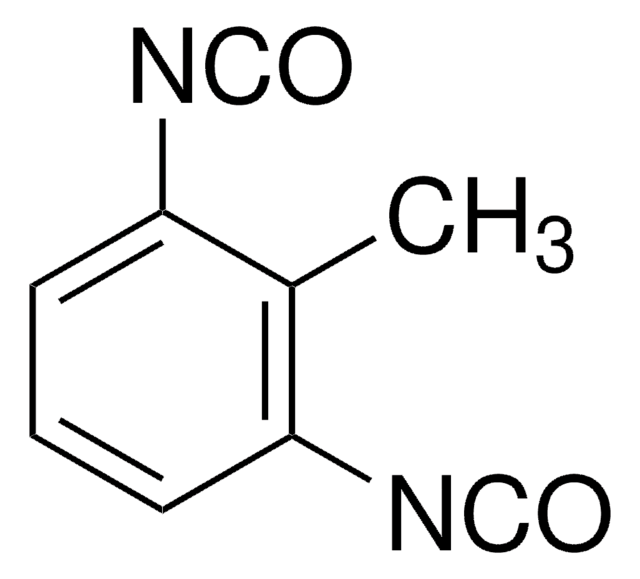317624
Isophorone diisocyanate
98%, mixture of isomers
Sinónimos:
5-Isocyanato-1-(isocyanatomethyl)-1,3,3-trimethylcyclohexane
About This Item
Productos recomendados
assay
98%
form
liquid
refractive index
n20/D 1.484 (lit.)
bp
158-159 °C/15 mmHg (lit.)
density
1.049 g/mL at 25 °C (lit.)
SMILES string
CC1(C)CC(CC(C)(CN=C=O)C1)N=C=O
InChI
1S/C12H18N2O2/c1-11(2)4-10(14-9-16)5-12(3,6-11)7-13-8-15/h10H,4-7H2,1-3H3
InChI key
NIMLQBUJDJZYEJ-UHFFFAOYSA-N
¿Está buscando productos similares? Visita Guía de comparación de productos
General description
Application
- Production of polyurethane coatings for automotive and industrial applications.
- Synthesis of polyurethane elastomers used in medical devices and sports equipment.
- Production of polyurethane foams used in upholstery, insulation, and packaging applications.
- Use in the manufacture of adhesives, sealants, and binders.
- In the synthesis of bridged silsesquioxane(BSQ) by sol-gel polycondensation with 3-aminopropyltriethoxysilane. The polymer of BSQ can be used to prepare the moisture-resistant film for UV filters.
- As a healing agent in the preparation of polyurethane microcapsules by interfacial polymerization.
- As a monomer in the synthesis of highly monodispersed polyurea microspheres via precipitation polymerization.
signalword
Danger
Hazard Classifications
Acute Tox. 1 Inhalation - Aquatic Chronic 2 - Eye Irrit. 2 - Resp. Sens. 1 - Skin Irrit. 2 - Skin Sens. 1 - STOT SE 3
target_organs
Respiratory system
Storage Class
6.1A - Combustible acute toxic Cat. 1 and 2 / very toxic hazardous materials
wgk_germany
WGK 2
flash_point_f
325.4 °F - closed cup
flash_point_c
163 °C - closed cup
ppe
Eyeshields, Faceshields, Gloves, type ABEK (EN14387) respirator filter
Certificados de análisis (COA)
Busque Certificados de análisis (COA) introduciendo el número de lote del producto. Los números de lote se encuentran en la etiqueta del producto después de las palabras «Lot» o «Batch»
¿Ya tiene este producto?
Encuentre la documentación para los productos que ha comprado recientemente en la Biblioteca de documentos.
Los clientes también vieron
Nuestro equipo de científicos tiene experiencia en todas las áreas de investigación: Ciencias de la vida, Ciencia de los materiales, Síntesis química, Cromatografía, Analítica y muchas otras.
Póngase en contacto con el Servicio técnico












